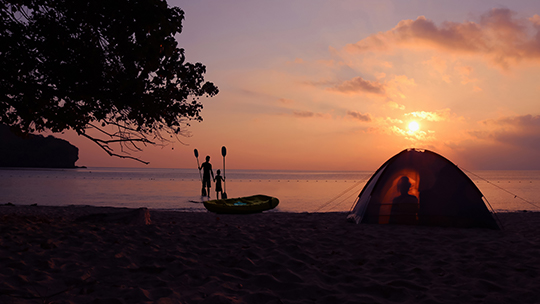Waking up to the sound of crashing waves is something most people only dream about. Here in the islands, it’s a year-round reality. Camping with family and friends is fun and allows you to unplug from modern conveniences.
Want to sleep under the stars? Here’s a few tips for beginners from Ed Mersino, who served as a volunteer outings leader for the Sierra Club of Hawaiʻi for 20 years.
Choose your campsite
Mersino says if you’re camping on the beach, be sure you’re well above the high tide mark. “When I've camped on the beach, I'll set up my tent in the forest or vegetative area above the sand,” he says.
If you’re camping in Hawaii’s forests, you‘re usually on a ridge or in a valley. “In valleys, it’s important to be above areas that are prone to flooding,” says Mersino. “On ridges, it’s helpful to be somehow protected from the driving wind. In both places, a well-drained, relatively flat spot is best.”
Mersino reminds beginners not to camp under dead or weak trees and to check trees in the area for dead branches waiting to fall.
Don’t start a campfire
Contrary to every movie you’ve seen, it’s better not to warm yourself by the fire. “If they get out of control, they can be real hazards to the forest and adjoining areas as well as to people and tents nearby,” says Mersino. “Even on beaches, [firewood] can leave nails and other hazardous materials behind as well as ugly black ashes on a clean white beach.”
Secure your food
Mersino says to make sure your food is enclosed in critter-proof containers. “We don't have bears, but we do have other animals that would love to get into your food cache,” he says.
Keep a light nearby
“It’s always good to be able to see when you need to find something in the dark or if something unexpected happens,” says Mersino.
Leave the kitchen sink at home
Mersino says people often forget that they have to carry everything on their back when they’re backpacking.
“It’s easy to overpack and take unnecessary things that add weight to a pack,” he says. “Once when backpacking the Na Pali Coast, a friend of a friend had a pack that weighed about 70 pounds. He almost fell over taking it from the van. In the first mile we had an intervention to radically lighten his pack. Take only what you absolutely need.”
.jpg)
.jpg)


